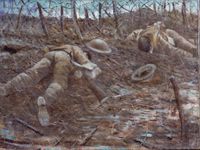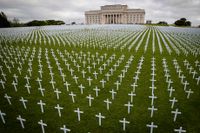English I
I read and analyzed English Literature from different times in history to compare language styles and other literary aspects and to learn about literary epochs in English Literature.
Literature I read and analyzed
Ambrose Bierce - An Occurrence at Owl Creek Bridge (short story)w (short story)
Rupert Brooke - The soldier (poetry)
Charles Sorley - When you see millions of the mouthless dead (poetry)
King James Version (Bible version)
Charles Dickens - A Christmas carol
Washington Irvin - The legend of sleepy hollow
Poetry
One of the most impressive poems, what "The Soldier" from Rupert Brooke. Sometimes I wish I could have written something like that. The poem was written during the "Great War", the first world war. It is full of patriotism and sentimentalism. Signifying, that the essence of the dead will live on and "somewhere give back the thoughts by England given". This was in a time, where people thought there was something like an "ether" which was where the radio waves fly, but where people could also pick up information in a sixth sense kind of way, which is reflected in the poem. Rupert Brooke actually died young himself, but never participated in battle.
The Soldier
The anti-poem that is essentially the complete opposite of the poem above, is a poem from Charles Sorley, who wrote the poem "When you see millions of the mouthless dead" which decries the senselessness of all this killing and stresses the fact that nobody will remember the soldiers and they do not live on "They are dead." This poem stresses the sheer magnitude and raw reality of the death and destruction of the killing fields of the WWI front.
I have been visiting many cities and villages during my time with Clonlara and I started to notice, that every ever so tiny village here in Germany, but also in the UK has a church with a monument that attests to the dozens of young men that never came back from this atrocious war. I was in a small village, that essentially consisted of one street, a church and 2 side alleys and there was a monument with 61 names on it. Surely farmers' sons from the neighboring farms who had let their lives. The scale is unimaginable. I also visited a restaurant, that used to be a young men's society house and even there, there was a copper plate about the ones who hadn't made it back. Their families in perpetual mourning, girlfriends who would never become wives, because so many of the men were gone forever and the soldiers themselves, slaughtered for some cause they probably hardly understood.
Other helpful resources I used
https://en.wikipedia.org/wiki/English_literature
https://www.britannica.com/art/English-literature
https://www.sparknotes.com/writinghelp/how-to-write-literary-analysis/
https://www.goshen.edu/academics/english/literary-analysis-guide/
https://writing.wisc.edu/handbook/assignments/closereading/
https://www.khanacademy.org/making-inferences-in-literary-texts-reading


